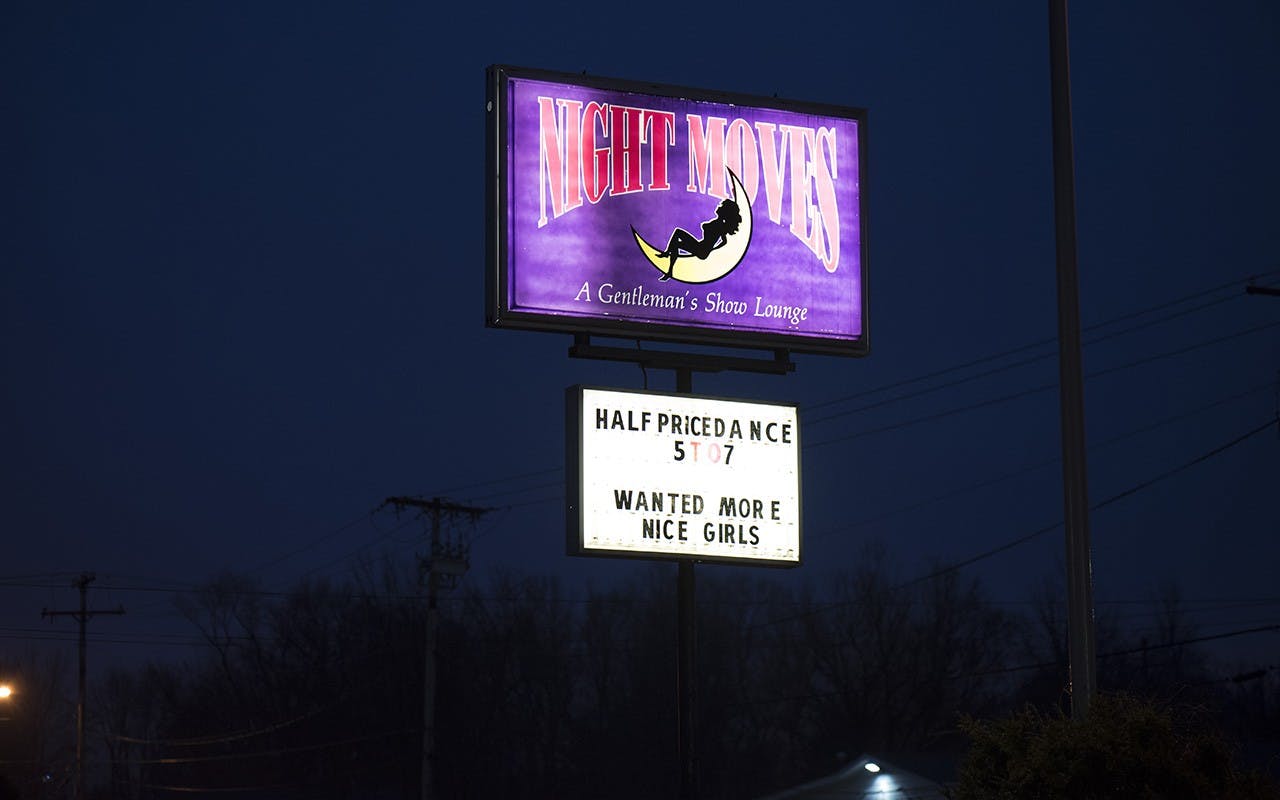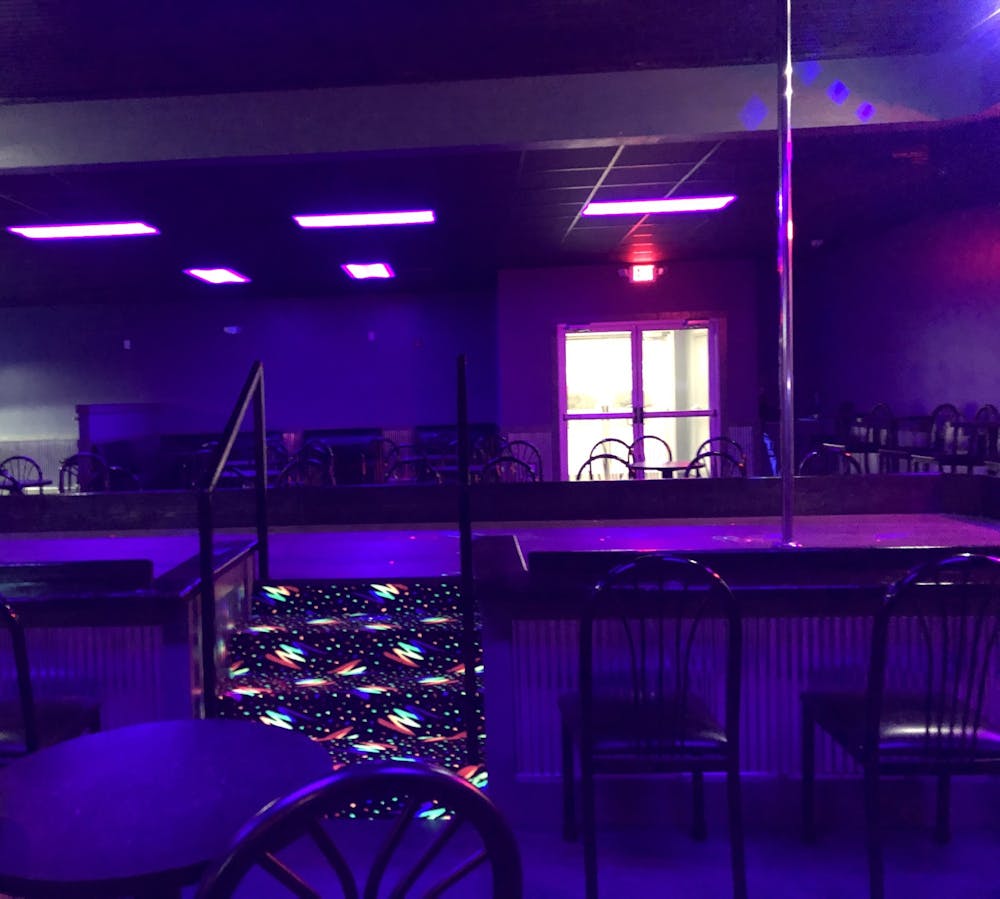Raven shoves the heavy door open with a thud, puncturing idle chatter in the dressing room with Hinder’s sandpapery rendition of “Lips of an Angel” rocking through the speakers. Spatters of applause and raucous voices fill the room for a moment — until the door closes again, muffling the sound of the club like static inside a seashell.
She strides across the room after finishing her set on stage. Seven-inch tall clear acrylic platforms – affectionately called pleasers – click the cement floor beneath her. Running her fingers through dyed-black hair, she flicks long tresses over the side of her face. The gun-metal silver eyeshadow dusted across her lids catches and glitters in the fluorescent light above.
The woman is 30 years old but looks to be about 25 thanks to her high cheekbones. She has an easy smile and a polite Midwestern accent. Clad in a gold and black strappy bra with a matching thong, she stands like a tower in her heels despite being only 5 feet tall.
Raven maneuvers between a cluster of dancers squeezed in front of the mirror to secure a spot across from her own reflection. Her blue-green eyes meet in the glass, veiled under a fluffy black fan of eyelashes.
At the club, she feels pretty. At the club, she’s someone else.
“I’m Raven here,” she says. “This is the ultimate version of myself. I feel confident in here. Whereas in real life, with real life shit that happens to you, I’m just not that person.”
When Raven looks in the mirror, Emily stares back at her.
“PRIVATE” a gray door warns. It shields the women inside from prying eyes darting through the club.
It’s around 10 p.m. on a Saturday night. Nightmoves, a small Bloomington strip club, is just beginning to crowd. Inside the dancers’ bustling dressing room, lined with lockers and duffel bags of lingerie, nearly nude women wisp in and out. The women beautify and legalize themselves. They cover their faces in powder to hide imperfections. They paint over their nipples with pink and white nail polish. In keeping with Indiana’s nudity laws, dancers must cover their chests and genitals in some way before they go on stage.
Vallery, another dancer, tucks her blond bob behind her ears. The pale 18-year-old looks down and paints herself white. She’s having a bad night; the clientele isn’t tipping well. She said IU frat boys with girlfriends keep asking to take her home.
“We’re normal people right outside of here,” she said. “We put on a persona, and we make money. We’re literally acting.”
The dressing room is the one place free from lusting eyes and ears — here, the women don’t have to act. They don’t have to be polite. They don’t have to be sexy. They walk in bare-faced and uncovered. In the brightly lit room, the women are seen clearly.
Nightmoves, located in a small lot off South Walnut Street, resides in the bones of the former Spring Dry Cleaners. If not for the meager lit sign stuck in the front lawn, depicting the silhouette of a woman straddling a crescent moon, one could drive right past the “Gentleman's Show Lounge.”
Past the pair of tinted glass doors, Joe guards the club’s entrance. Acting as a sort of Hoosier Cerberus, Joe sits on a stool in the corner of the entryway, checking IDs and collecting guests’ $7 weekend cover fee.
Pink and purple hues splash across the dark room, illuminated only by neon bar signs and LED spotlights. Mirrored walls make the modest club appear bigger, but not by much. It’s definitely a small-town strip club.

Several of the dancers have worked in larger nearby cities like Indianapolis but say they prefer the cozier feeling in Nightmoves. Raven — who began stripping in Indianapolis in 2016 — says dancing in the city was “cutthroat.” She said the girls in other clubs were less friendly than in Bloomington. Drug use was pervasive, and expectations for the dancers’ appearances were harsher. Some women have worked in clubs with weight requirements; others said they’ve worked in clubs that favored white dancers over women of color.
Another dancer, Heaven, has a sweet, calm voice. They sound wounded when they talk about bigger clubs’ racist hiring policies.
“I went to Indy for a week,” they say. “They weren’t really trying to hire black girls with natural hair.”
Some of the women say customers are more aggressive in Indianapolis. Valentine, a 21-year-old dancer, said she’s heard stories of customers robbing or assaulting dancers. Here, she said the “worst that’s happened” to her has been men trying to yank her underwear down or put money inside of her. In this industry, she said her experiences are deemed mild.
Raven said she appreciates Nightmoves’ strict policies. She thinks management in other clubs are more likely to allow illegal behavior to slide. Drug use, inappropriate monetary favors or touching is far more common. Most of the dancers are private about this fact. They whisper about stories they’ve heard from Indianapolis, or shrug “it’s none of my business.” Many said while they don’t judge the women who perform sexual favors for money, those individuals make dancers’ jobs harder. Men come in with incorrect assumptions about what dancers will do for them and treat them poorly once told they’re mistaken.
At Nightmoves, employees said that behavior is never tolerated. Security watches them closely, Raven said. Many of them feel safer here.
In such a small environment, the women have grown close. A Beech Grove native, Raven only moved to Bloomington this July. Since then, she’s tried to learn the area, to make friends.
“I know strippers,” Raven giggled shyly. “I haven't met a whole lot of other people.”
Emily is running late to lunch Thursday. She wasn’t sure where to eat because she still feels new to Bloomington. After moving with her wife in June, Emily hasn’t gone many places outside of work. She settles on the Runcible Spoon Cafe on Sixth Street. Eventually, Emily bustles into the restaurant and tucks herself into the corner of a big black booth.
On this afternoon, Emily Baker swapped her platforms for sparkly silver flip flops. Her long hair is knotted in the back of her head, and her frame is cloaked in an oversized “INDIANA” sweatshirt. Her face is bare and tired. Without the faux lashes to obscure them, it’s easier to see now that one eye looks bluer than the other. Raven’s facade had been washed off, leaving Emily in her wake.
She knows what’s coming, but her voice sounds steady. Emily debates with the waitress.
“What’s better?” She asks. “The eggs benedict or the Reuben?”
She decides on the sandwich, banking on having leftovers for dinner tonight.
Sipping a coke, Emily volunteers that she relapsed on meth over the weekend.
After being released from the Owen County Jail in June, Emily said her mood spiraled quickly. She got back on drugs and soon plummeted into a severe depression — the cause behind her most recent relapse.
“Sometimes using drugs forces you to be happy,” Emily said. “It releases those endorphins in your brain. It's like you can just pretend that you're not depressed for a short little minute.”
Emily has been addicted to opioids since she was 15 years old. She started doing heroin when she was 21, meth when she was 23. Collectively, she’s been in and out of jail and rehab for more than six years. She came to Nightmoves this summer after being released from a one and a half year-long stay in jail for her involvement in an armed robbery. She doesn’t say much about it because her codefendant’s case is still being litigated, but she admits she often has nightmares about that night.
The restaurant is quiet and mostly empty, spare the two men sitting together nearby typing on their laptops in silence. Still, Emily isn’t shy about her past; she never seems to whisper or sugar coat. She doesn’t care who hears, she’s just worried about her relapse.
It’s hard for Emily to lose the progress she made during her time spent incarcerated, all the work she put in to get clean.

“It just hits you,” Emily said. “Because I know I'm better than that. I know that. I've worked hard for what I had.”
After tearing both of her anterior cruciate ligaments in gymnastics and softball injuries when she was 13, Emily’s doctors began prescribing her opiates. She said she noticed signs of her addiction by the time she was 15. When pill bottles recommended “Take every four to six hours,” Emily would anxiously wait until she could take her next dose, popping a pill every four hours exactly.
She stresses that addiction doesn’t discriminate. Growing up, her mother worked for the Indianapolis Metropolitan Police Department, her father for the Marion County Sherrif’s Office. She said she was taught right from wrong, taught to have a moral compass.
But addiction runs in Emily’s family. She douses her home fried potatoes in ketchup while she talks about her dad’s first overdose in her childhood home.
Through bites of food, Emily recounts looking down to see her father’s limp, blue body at the foot of the stairs when she was 15. He laid unconscious in a pile of his own vomit. Terrified, Emily knelt to attend to her father. She knew how to give him CPR until the paramedics came because she worked a part-time job as a lifeguard at the time.
Her father’s addiction persisted throughout her teenage years, coinciding with her own. Eventually, her dad was fired from the sheriff's office after overdosing again while at work. Afterward, she remembers neighbors and classmates belittling her family, calling her dad a hypocrite.
When those same neighbors read about Emily’s own addiction and legal troubles in the paper years later, she read through the article’s comments and cried.
“She used to be so sweet” some said.
“She was a cheerleader. What happened?”
Emily has overdosed on several occasions herself but said she only needed to be revived with Narcan a handful of times. Though she can’t remember it, Emily said her high school sweetheart, Chris, was one of the paramedics who arrived at the scene of her worst overdose. She heard the incident deeply unsettled him. When she tried to reach out to him afterwards, he refused to hear from her.
As she continues to explain the past, her voice grows increasingly fatigued, disappointed. Emily said she’s known at least 30 people in her lifetime who have died from heroin overdoses. Her best friend, her first-ever girlfriend and her former-fiancé each died while she was in jail within a span of 6 weeks. Her mom called her on the jail’s phone to tell her about each of them.
She lost it, Emily said. Overwhelmed with pain, she remembers a guard took her into the Owen County recreation room to lay on a mat privately. There she curled up, devastated, sobbing and screaming. The guard, Officer Mimms, knelt on the ground with Emily and held her hand as she cried, praying over her.
“She’s a great girl,” Emily said with a small smile.
The longest Emily has ever stayed sober was during her incarceration. She admits going to jail was the “best thing” to ever happen to her. She thinks she’d be dead if she hadn’t.
Still, Emily says addiction and depression feel like jail to her — the same cycle every day.
Wake up, find dope. Take a shot, go to sleep. Get money, get dope.
“I don't miss heroin at all,” she said. “The life that comes along with it, it’s living the same day over and over.”
Even though time at Owen County helped her stay clean, she said she prays she doesn’t wind up incarcerated again. Emily has a reason to stay clean and stay out of jail: her 9-year-old son.
Before she talks about him, she steps outside the restaurant to smoke a cigarette. Emily remained composed while she spoke about her father’s overdose, her friends’ deaths. Now, talking about her son, she hunches over a patio table, choking back gentle tears.
Emily granted her father’s ex-wife custody of her son in 2016. Emily and her father were struggling with addiction; her mother has debilitating chronic health issues; and her son’s dad wasn’t able to provide a safe home for him at the time. Emily thought her stepmother’s home would be the healthiest place for her son.
He was a “mama’s boy,” Emily said. When she was doing better, she’d go to his guardian’s house to visit her son every single day. Legally, the court has dictated that Emily can see her son whenever she wants. However, her son’s guardian hasn’t let Emily see or speak to him since Christmas of 2021. Shortly before that Christmas, Emily had another relapse.
“I don’t get to be called mama,” Emily said as her eyes well up with tears, “I haven’t been Mom for a long time. He has to call me Emily. (His guardian) makes him.”
Now, Emily and her wife are figuring out how to stay sober and get her son back. The couple is planning to have a baby of their own soon via sperm donation. Emily said she knows her partner will be a great mom.
Even though she’s thrilled about the potential of a new baby, Emily said her son is still her first priority. She’d hate for her son to feel that he’s been replaced, or that he isn’t constantly at the forefront of her mind.
“I want to do it right. Do it over again,” Emily said. “That doesn't mean that I want to give up on my son. I just want to do it the right way.”
Two months later, Emily reviews her story over the phone. She’s glad that people will hear her perspective, glad that other struggling addicts may be able to recognize themselves in her. While she’s still experiencing addiction, Emily says she sees an end in sight.
She’s unsure how she’ll get there, but she has hope that she will.
Around the dressing room, dancers tell each other jokes and swap lingerie tops. They complain about their boyfriends, their girlfriends, their parents and their kids’ parents. Camille’s friend said something rude about her sister. Jade found an unfamiliar condom wrapper in her newly-ex boyfriend’s robe. Electra’s grandma hates her belly button piercing. The women share eyeshadow, vapes and dab pens.
Sydney, who’s 35, has worked at Nightmoves for 16 years. Most nights, she still needs help curling the back of her hair. Electra and Roxy, each 19, both came to Nightmoves after having their babies. They said the job makes them feel more confident — Electra said everything changed for her self-esteem once her coworkers started complimenting her postpartum body.
One Hispanic dancer doesn’t speak English very well. A younger dancer approaches with her phone’s keyboard facing out. The Google Translate app is open to mediate.
“¿Puedo usar una toallita desmaquilladora?” she types into the phone.
“Can I use a makeup remover wipe?” an automated voice spits back.
“It’s a small family here,” Vallery said. The 18-year-old drove up to Nightmoves right after her high school graduation ceremony to land a job.
The dressing room resembles a public high school locker room, complete with all the profanity and paraphernalia you’re poised to find inside. Sharpie, glitter glue and purple leopard print tape adorn the exteriors of lockers. The thick smell of body odor, THC cartridges and Bath and Body Works’ “A Thousand Wishes” body spray clings to the air. Noses tingle with sweat, weed and candied-peonies — a scent not unfamiliar to someone who’s taken 10th grade gym class.
Inside the gray and blue walls, women make their marks, claim their spaces.
“Fuck Bitches Get Money, Princess” is scrawled across Angel’s locker in blue marker. Holographic stickers on Cherry’s spell “EAT ME.” Candace’s locker demands “Look @ dat ASS!” Chanel’s locker is under Brooklynn’s. Luxxi, Exotica and Sapphire appear to share one.
Throughout the night, dancers flitter in and out of the room. Some women waltz in with wads of cash overflowing from their purse. Other times, they slump in looking defeated and resume a seated position on the counter while they drag at their vapes, play on their phones and try to rally for another walk around in the club.
The stigma around stripping is undeniable, and each of the dancers wants to set the record straight. Countless times, they’ve been called prostitutes, or a cruder version of the title, by people they considered friends. Raven said some loved ones disowned her once they found out she was a stripper.
“We're not prostitutes,” Vallery said. Her voice sounds hoarse and irritated. “We're dancers. We're here to entertain you, not to fucking take you into the back and give you a blow job.”
At work tonight, many of the dancers will simply offer companionship. That’s what most of the men who come in are looking for.
“You don’t even have to dance for them,” Raven said. “You just sit down and talk to them. You're low-key a therapist.”
The dancers provide a service; they provide what clients want. Back in Indianapolis, an 83-year-old man would offer Raven $250 to step her sharp heels across his chest. She said she never did; she was worried about his health, being a fragile older man. One dancer, Echo, keeps a small notebook in her locker to document her weirdest customer interactions. One man asked to smell her armpit during a lap dance. Another moaned then said, “Do you want to join the army?” Some fantasies are less hysterical, more horrifying. One dancer recalled feeling sick after a man she danced for told her she looked like his daughter.
Desire pays in the club. Jade is stooped beside the entrance to Nightmoves, burning a cigarette with a hot pink lighter. Her black silk robe hangs open, letting her lace lingerie face the street. She brushes curly brown hair from her forehead, looking wistful. Tonight is her first shift back at Nightmoves in two years.
The 31-year-old dancer says she’s “into psychology.” She tries to understand how her clients think — who her clients are.
She likes to wear Victoria’s Secret “Love Spell” perfume — a popular choice in the early 2000s. Jade said the scent was a favorite among many of her client’s first girlfriends. She coats her body in glitter to ensure when men go home to their spouses, she’s left her mark on them to show where they’ve been. Jade is intentional in what she does here, and she thinks the rest of the girls need to be as well.
“No one should go into this without a plan,” Jade said sternly.

She thinks each of the girls needs to want something else, something more for their lives outside of stripping. While most of the staff keep clothes or makeup in their lockers each night, Jade leaves hers bare. Since she started dancing, Jade takes everything she owns with her to and from work each evening.
“I take my shit every time,” Jade said. “With the idea of, maybe, I won’t need to come back.”
It’s not an easy job. Valentine said she’s worried young women on the internet, especially TikTok, have become too enthralled with the glamorization of stripping. She said women need to realize the work comes with harassment, body issues and sexual assault. This worries Raven too. When she visits her 2-year-old niece, she’s frustrated with how her sister will turn on music and jokingly tell her daughter to “shake your butt like Mimi” — Raven’s affectionate aunt nickname.
Raven loves stripping – she said it makes her feel like she’s reached “self-actualization” on Maslow’s Hierarchy of Needs. Still, this kind of job is nothing she’d ever want for a loved one.
But she wouldn’t change it. Her easy smile falters slightly as she explains she has borderline personality disorder, a mood disorder affecting her self-esteem. She admits stripping is probably a response to her struggling mental health, her traumatic past. But when she’s stripping, Raven can feel truly sexy, truly confident.
“It’s just a job,” Raven said. The words seem to come out rehearsed, like she’s explained this a few too many times before. “We sell fantasies in here. This is not real. It’s not real.”
It’s the next Saturday. Jade isn’t at Nightmoves, and of course, neither is her bag.
“Jade?” Nightmoves’ manager Ivory says, voice flat. “I don’t expect to see her for a long time.”
Have a plan. Maybe you won’t need to come back.
Past the threshold of the dressing room doorway, these women fade into the darkened club. Under the purple neon spotlights, they’re strippers. But the sterile light bulbs in the dressing room shine above moms, caretakers, IU students and singers.
Many of the dancers have plans. Many don’t. Young mothers Roxy, Electra and Mocha just want to provide for their babies. Echo and Calypso have been friends since fifth grade. They used to pretend to pole dance on their elementary school jungle gym together; for them, this was always the plan. Sydney wants to retire from stripping to become a live-in caretaker for the elderly. Vallery wants to gather enough cash to move out of her boyfriend’s house. One day, she thinks she might finish securing her cosmetology license online.
Raven wants to get her son back and start a family with her wife. Still, she thinks her ultimate purpose is to help other addicts work through their struggles. She said the men who come into the club looking for company — for someone to listen — help Raven practice what she wants to do: use her past for good.
“My concept of God is a little bit warped,” Raven said. “I don't know what to believe. I know what I want to believe. But I think I'm here to help other addicts.”
Last call is 3:30 a.m. Dancers trudge into the dressing room; it’s the most crowded it’s been all night. Some girls Facetime sleepy boyfriends who are waiting up for them at home. Others sit on the floor, counting dollar bills in silence. The smell of “A Thousand Wishes” is smothered by the earthy scent of cash. Girls peel off their eyelashes, roll off their G-strings. Vallery removes her thigh-high white boots to reveal the Halloween ghost socks she’s been wearing underneath. She says wearing fun socks to work is her “weird thing.”
In their pajamas and slippers, everyone looks younger. They sit on the floor with stuffed overnight bags in hand like girls at a sleepover.
Once Joe comes to walk the dancers out to their cars, the room begins to clear, and the dressing room empties for the night.
One lone metal locker remains untouched in the back left corner. There’s no tape, scribbles or swear words scrawled across it. Just one message.
“Be kind to yourself,” someone has written on the locker in Sharpie, next to a big heart.
The dancers turn off the fluorescent lights and trickle out of the dressing room, past the threshold, into the dark Bloomington morning. Raven slip tips from the night into her bra, creeping out the door early with her earnings. A small piece of what she’s done tonight will only be for her.




